
Wedding Wrap-Up ««« 2014 »»» More Eureka!
08.01.14
-Sigrid Undset
All my days I have longed equally to travel the right road and to take my own errant path.
Honeymoon: Eureka!
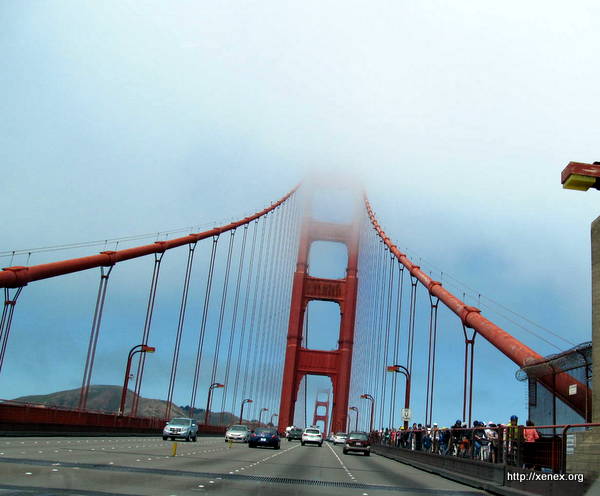
We woke at 4am to make our plane to San Francisco, which is as fine a reason as any for how philosophical the clouds make me. I hate pictures from plane windows. I have been panicked with forced perspective, the awareness that the momentary carelessness of a pilot I will never meet could kill me without my consent or control. A two-dimensional cotton ball stuck to a robin's egg conveys none of the existential unease clouds from above should.
Amber and I were barely home, unpacking but not putting away artifacts from our wedding (mostly food that will nourish Rebecca, who is staying at the apartment and tending Amber's garden). We slept maybe four and a half hours, plus micro sleep on the plane between flight attendants offering to sell us cheese, which they did like clockwork every forty minutes.
We wrangle to get a rental car at the airport (though we had set it up well in advance, they refuse to acknowledge that), then Amber informs me that we are driving five hours to Eureka and our bed and breakfast for tonight.
"Why? Why would we ever want to do that?" I ask.
"There are things in Eureka that I want to do," she says simply.
"Then why didn't we land nearer to Eureka?" I ask.
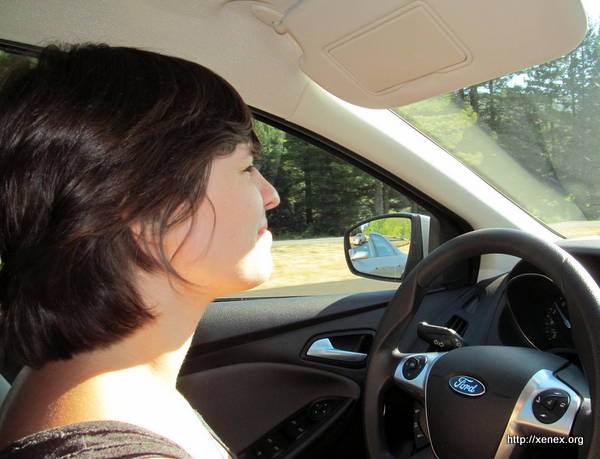
"This was cheaper," she assures me, though her father paid for our tickets so I feel this may not be the strongest argument. She does inform me, not for the first time, that she likes driving long distances. She may as well have told me that she enjoys eating scorpions. Yes, I understand that some people must, but I let it slip from my mind that those close to me might be among their odd number.
I, on the other hand, like to spend a bit of time outside the car each day. It's a funny habit I have. If I have to spend four hours round trip to get somewhere, there have better be at least eight hours of solid ground between. I don't mind walking somewhere within reason, but there is little one can do in a moving can that feels worth doing.
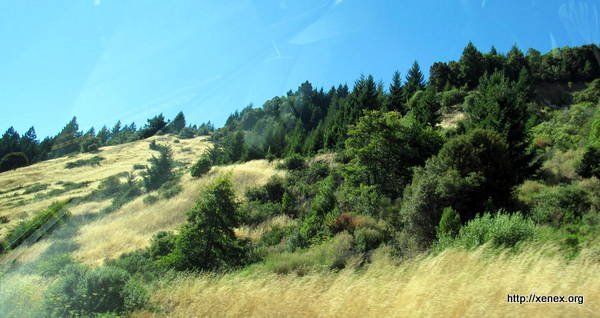
Still, I am not too bothered. I will get to road trip up the California coast with my new wife. This is theatrical fodder, if only I can find the right diegetic soundtrack. Within a handful of minutes, we cross the famed Golden Gate Bridge, which you may know best from the opening credits of Full House. It is shrouded in a dense fog that partly clears once we are on the other side. This may be the bridge's native state.
As is so often the case, Hollywood has ruined me. A drive up the California coast should be scenic and exciting. This may well be the case when the state is now suffering from one of the worst droughts in recorded history. The hills are yellow with desiccation. We pass by rocky outcroppings, vast bareness in the midst of thirsty grass and trees. It is only the third time we pass one of these arid gulches that I understand these should be lush rivers, overflowing their banks to the delight of the vegetation.
I flick through the radio stations, trying to make myself useful as passenger, but I find that the stations are erratic and, despite my assumption of the culture in the Bay Area, mostly bad country music. We find small oases on the dial, but they last only a song or two before we have passed through them again.
Three hours into the trip, we see our first redwood. We are uncertain that it is a redwood, since it is just a tallish sort of tree, alone among a dead field. It is only later, as they positively wall us from sight, our road between arboreal giants, that I can be sure that we had seen one forty minutes before.
This highway is one of the selling points to Eureka. We see occasional cars stopped at wide patches of the shoulder, passengers staring wide mouthed to the tops of the trees as though turkeys about to drown in a rainstorm.
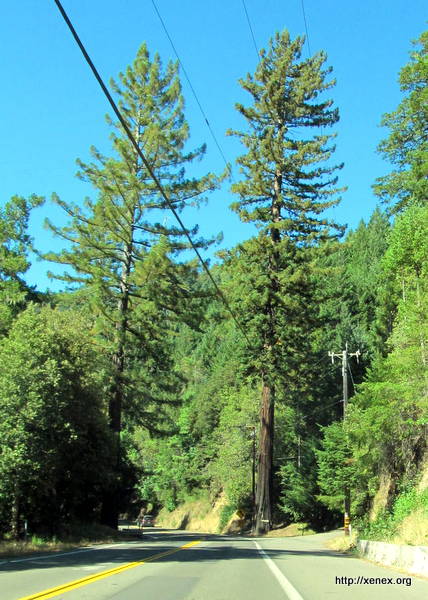
Yes, the trees are massive. Yes, I believe they should be protected, since they have been around longer than this country has had its name. However, I quickly become immune to their grandeur on this drive. I have seen trees in profusion, having grown up in the Hudson Valley. I can appreciate an exponential uptick in size and they are intimidating when they number in the thousands, closing in on my rental car. However, their numbers work to their disadvantage, as they no longer seem rare to me, whizzing by at sixty miles an hour.
Along the road, we spy roadside attractions, stands talking of Bigfoots, featuring chainsaw sculptures, or advertising mystery spots. I look with puppy eyes at Amber, who tells me that we can stop if I absolutely have to, but that we are on a loose schedule and ought to check in before it gets dark. I tell her that I will grant her schedule now, but that I want to visit the mystery spot on our way back to San Francisco or our marriage may be in jeopardy.
Our rental car has a sensor that inform us the temperature outside, though we are in our climate controlled chariot. It drops tend degrees when we are in the shadow of the redwoods, then rises to mid-nineties when they release us from their wooden grasp. As we approach Eureka, we are swaddled in a gray fog. The gauge lowers by thirty degrees, into the low sixties. I was warned to dress warmly despite the time of year, so this ranks only as an inconvenience.
"Now entering Silent Hill?" I hazard as we pass dilapidated industrial equipment.
Eureka is our staging area at a bed and breakfast run by a warm, middle-aged woman. The amenities are beyond reproach, which is to say that she parted from others from her demographic group to greet us with a small cast iron skillet filled with a chocolate chip cookie. The room--really the top floor of a house--is delightful and cozy.I could love a honeymoon in just these walls.
Eureka itself is lacking. I quickly share with Amber my fear that this is the slums of California and a chilly one at that.
We asked our hostess to suggest a seafood restaurant and she says the Sea Grill has the best food anywhere. The waitstaff is bizarrely terse and the food is far from worth the price, hardly better than Red Lobster without the balm of cheddar bay biscuits. The biggest thing I can say for the restaurant is that their walls play host to paintings of fish made with actual painted fish.
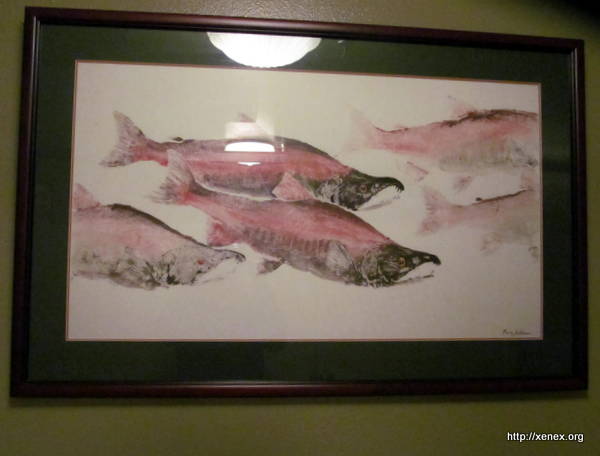
When we leave to explore the town (closed but for a bar blasting German metal) we discover a homeless person sleeping under a bench near the bay.
"What is the charm of Eureka, again?" I ask Amber.
"You'll see tomorrow, promise."
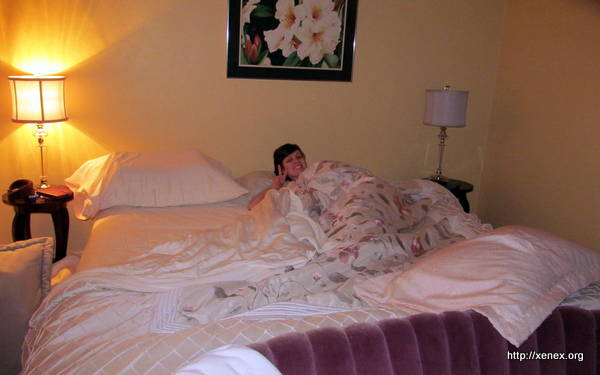
We retire to the room and the California King bed. I am sure tender care has been taken to the arrangement of our room, but I am too tired from the drive to take much further notice of it.
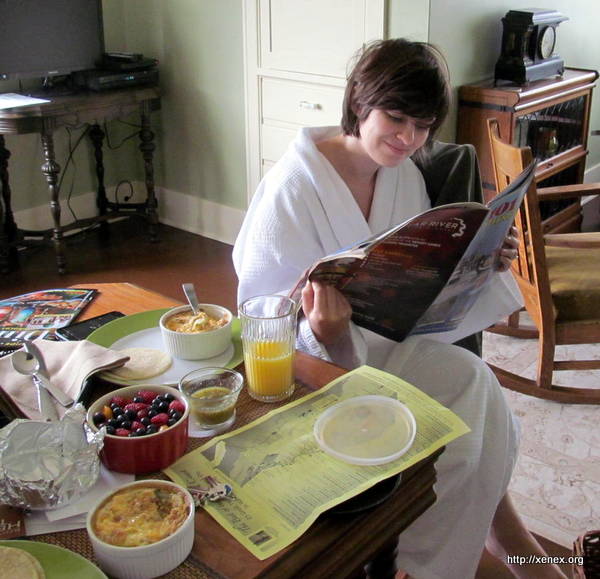
The next morning, we hear a knock. The proprietress has placed a basket full of breakfast at our door, though we do not see her. Inside is a bowl full of mixed fruit, two bowls with an egg concoction, and flat doughy discs.
"Pancakes?" I guess.
Amber sniffs. "No. Tortillas."
I open a small jar and there is salsa verde. We make small, breakfast burritos out of our huevos rancheros, lounging around in the white robes that came with our room. Amber thumbs through a tourist guide, cozy in a white robe.
As we finish up, I ask Amber what the plan is for today. After the surprise that was a road trip for five hours, I want to have a clear idea of what to expect. Amber now has a welcome pack with a yellow map of attractions and a guidebook, so I feel we may be on steadier ground. There will be no more ridiculousness like driving for five hours, I'm sure of that.
"We are going to Willow Creek to see the famous Bigfoot Museum." She had, in fact, enticed me into coming to California in part because it featured multiple Bigfoot Museums. The famous Patterson-Gimlin video, which is better known as the shaky cam of a sasquatch looking over its shoulder, was filmed near there and is possibly their sole claim to fame.
I dozed on the drive, though Amber tapped me when there was a vista of particular beauty. Like the redwoods themselves, these come with rapidity and in clusters. The yellow geography of California is host to massive peaks and valleys, one after the other and all with snaking roads. The geography of northern California makes it impossible to get anywhere efficiently, but at least one has the pleasure of a scenic view to soothe away the road rage.
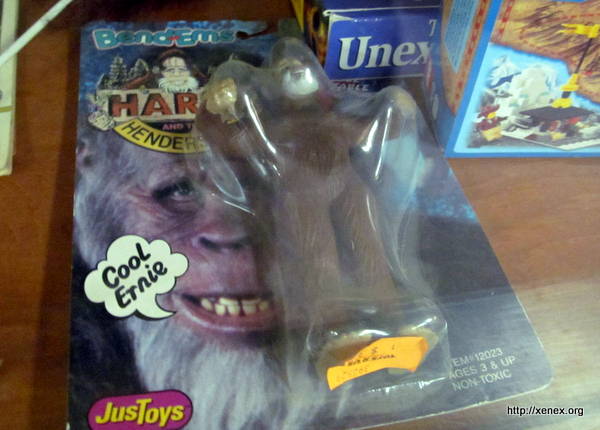
We arrive in Willow Creek and I have to laugh. It is a tiny town, not that different from any other we had passed through. The town itself has a few references to Bigfoot-a bulletin board outside a shop is roughly foot shaped and there is a hotel bearing his name-but it is otherwise a town that doesn't much care.
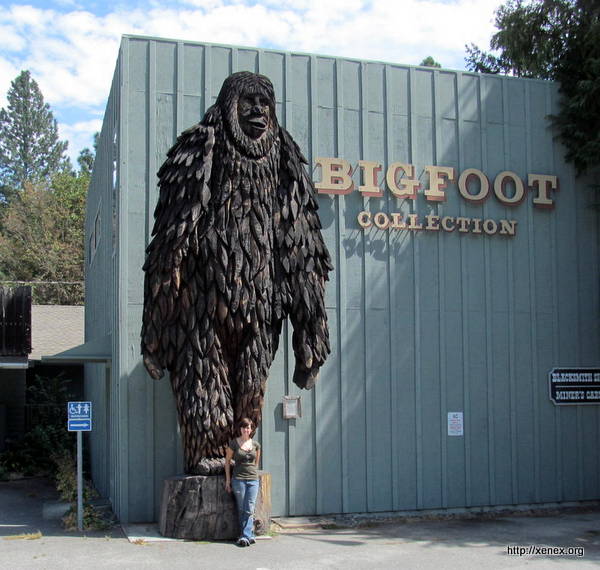
We pass the museum, a forty foot tall sasquatch out front. This is reputed to be one of the biggest and best Bigfoot museums in the world, as it should be given that this is the origin of much of the North American Bigfoot mythology.
The way the yellow map and accompanying guidebook makes it sound, this is a massive complex dedicated to rooting out Bigfoot wherever he may be. Instead, there are aluminum Jell-O tins and a middle schoolers attempt at a Bigfoot checkerboard, less about three-fourths of the squares and most of the sasquatches. They also have a Harry and the Hendersons figure still in a box, which might be the most historical artifact of the phenomena. They do have blow-ups of the Patterson-Gimlin footage, but there is nothing particularly historic. I wonder how much of a kickback this tiny museum could give to the makers of the tourist information for keeping them included. This was no small drive.
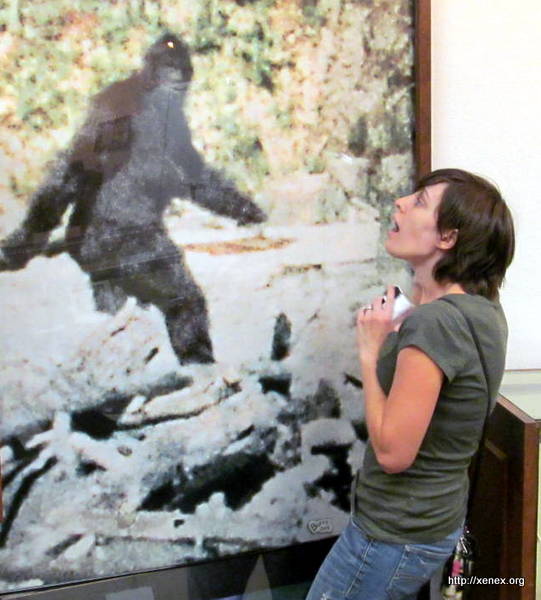
Amber has intentions to find Fern Canyon. I don't know what this is, but the day is young and my stomach is full from breakfast, so I welcome the adventure.
An hour and a mountain pass later, we stop at what purports to be a Native American museum. It is locked and closed, with a sign informing the curious that whoever should be running it is teaching language lessons elsewhere, but we can call if we really need to see anything within. I cup my hands around my eyes to peek inside and see a few glass cases, but nothing particularly of interest.
Amber and I wander into the casino--because of course a Native American museum is housed with a casino in a mini-mall--and waste a dollar so she can show me what a pull tab game is. Around us are a lot of dejected white people, pushing coins into machines without much verge.
When we leave, I pull the locked door of the museum one more time and it opens. Maybe it was unlocked before, though it was dark and the handwritten note warned me away. A sleepy looking man walks out of a back room, eyes us, flicks a light on, and then ignores us until we leave three minutes later, having seen everything worth seeing.
We leave the casino/museum. "Should we get lunch here?" I ask. There is a pizza place and... that's really it. Still, how bad could pizza be?
"No, let's see what in the next town," says my wife.
We both grew up in the Hudson Valley, where the next town tends to be no more than ten or twenty minutes and all offer a variety of dining options. On the yellow map, this root looks downright uneventful. We should drive west for a little while and end up near a park. In reality, the map is an evil lie. This route takes us up a mountain, which isn't necessarily a problem. We do have a rental car and some aggressive wear-and-tear is to be expected, though I am certain the transmission would fall out of my car if we attempted this.
The problem begins when the road sharply veers back and forth every fifty feet or so. There is barely any space to let another car pass, so it is plain we cannot turn around. Even if we could, Amber has her destination in mind, promised to her by the yellow map.
I manage to be both hungry, since another hour has been added to the tally of my hunger, and the most car sick I have been in my life. I recline my seat back and stare through the sunroof in hopes I can settle my stomach by looking at the clouds.
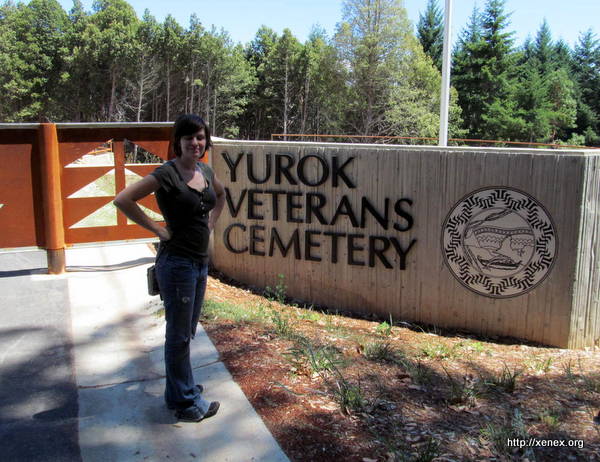
"Is that a cemetery?" Amber asks, pointing to the right.
I bolt upright and look out the window, where I see a low stone wall emblazoned with the words "Yurok Veterans Cemetery." "Amber, we are very far up this awful mountain. No reasonable person would build a graveyard up here and absolutely no one would take this nauseating trip to visit their deceased loved ones. This is a horror movie trap."
"So, we are stopping to check it out?"
"Obviously."
We leave the car outside the front gate as it seems unlikely anyone could care enough about illegal parking to drive all the way up here to patrol. Short of setting fire to the forest, no one could possibly care what we do up here.
Several things immediately become clear. One, the bathrooms are locked, so we cannot indulge in marital relations in the midst of the dead and then clean up afterward. Two, there are no graves, thus no explicit dead bodies. There is a quantity of upturned dirt just after we enter, but I have my doubts that any Native American veterans have been planted, awaiting headstones. This seems to be an aspirational cemetery, one built so out of the way because no one really wants this memorial to serve any purpose. The workers who built this much have my sincere sympathy.
We wander around its paved surfaces, admiring the sink carved out of a slab of marble but left without a tap, until we find a cleared path some fifteen feet across, which might one day be an adjoining road. The view is incredible, but most views are from mountains, particularly Californian ones.
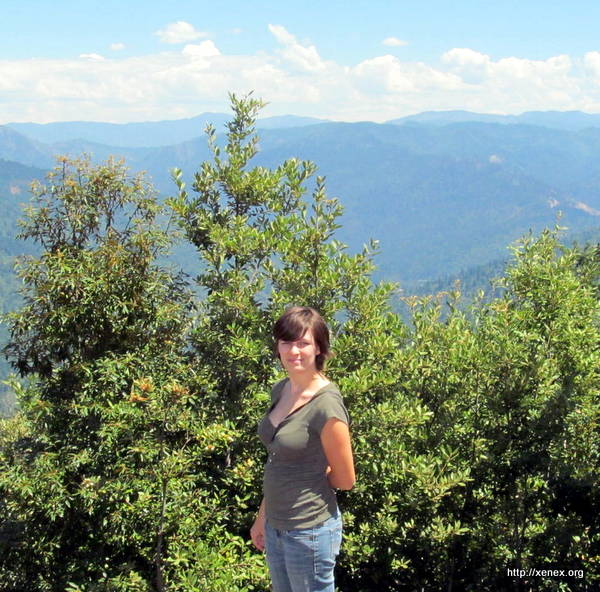
We contemplate befouling the cemetery with outdoor sex, but the nausea still hasn't left me and this isn't really the most romantic of settings.
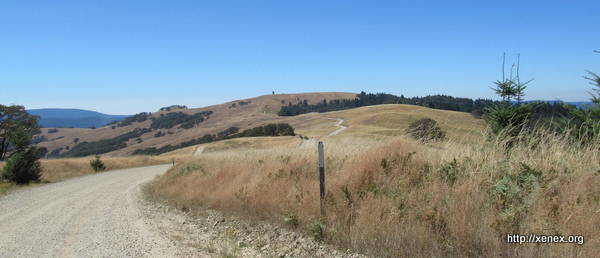
We get back in the car and continue on the road, hoping the mountain descends soon. Instead, the pavement ends.
"GPS! Where have you taken us?" I yell.
Amber is not flustered by this and keeps driving on yellow dirt.
"We're going to die out here. I want you to know that. You have forsaken us!"
"We're fine," Amber assure me. "The GPS thinks this is a road."
"This is a field. An arid, rocky place where seeds can find no purchase."
Amber giggles. "There is a bush right there."
"I don't believe it. It is a coyote waiting in ambush, cleverly disguised as a bush. It is meant to lure us into complacency," I say, poking her in the side of the head. "Why do you believe its lies?"
We drive for seven rough miles through this field, turning our car roughly tan with the dust of the path, but we do eventually find a paved road again and make our way down the mountain without much more nausea on my part.
We assume there must be food somewhere near a park because tourists would be attracted here. It is simple economics and we haven't really eaten since breakfast, eight hours before. Amber considers that we should just go to the park, but gathers that I might have to turn to cannibalism if she doesn't find us food soon.
It is here that we discover that northern California is a food desert. There are not even gas stations that might provide plastic wrapped sandwiches to give us salmonella. We drive toward the only restaurant the GPS says exists, twenty miles to the north. We are nearly to Oregon at this point, though the evil map doesn't tell us that.
Amber motions out the window at a gorgeous view.
"Stunning vistas," I agree, "but you can't eat them."
"I guess you are just tired of beauty," she chides.
I knit my fingers through her hair. "No, I'll never get tired of you."
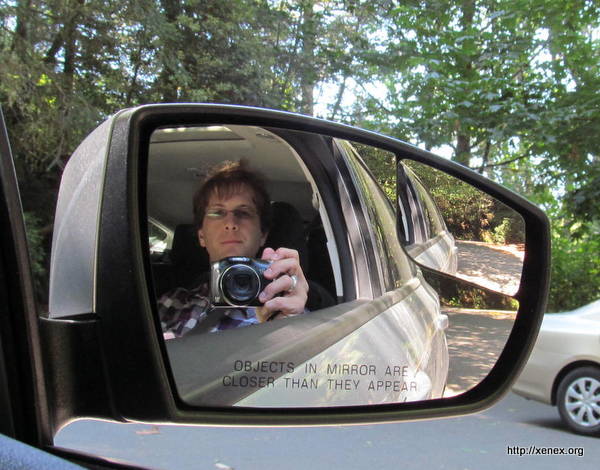
We eventually find a diner at 3:45. They close at 4. I have never in my life encounter a diner that does not see the purpose of staying open beyond dinner, but California does not seem to obey cosmic laws. Certainly in a place so bereft of food, I could see the commercial value of getting money from starved travelers. I am able to cajole the waiter to make us a couple of sandwiches at a premium, so long as we leave immediately. While we wait, Amber harasses an emu the proprietor have penned outside. I assume it is intended to eventually be food. If they did not feed me, I was tempted to eat it myself.
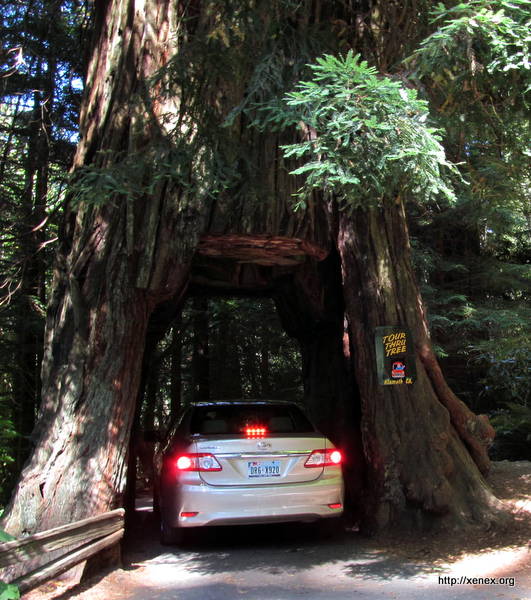
Briefly nourished by a chicken sandwich and fries so overcooked they might have been rejected potato chips, Amber and I avail ourselves of one of the supposed joys of California, paying $5 to wait in line to drive through a redwood. We could easily have just walked through the redwood ($2 a head) or-and I know this is a daring concept-walked up to any of the other redwoods. There is not much value to driving through one rather than simply around, but we are a bit too loopy to care.
We drive around, trying to find our way back from whence we came with the help of the GPS, which has no interest in facilitating our journey. Instead, it brings us through an impoverished looking collection of trailers near a reservation. We gather that these people likely work for the casinos, though we cannot figure out where one might be on this side of the mounain, though it is beyond us how they acquire enough food to survive. There are no apparent grocery stores and we ate at the only diner within fifty miles.
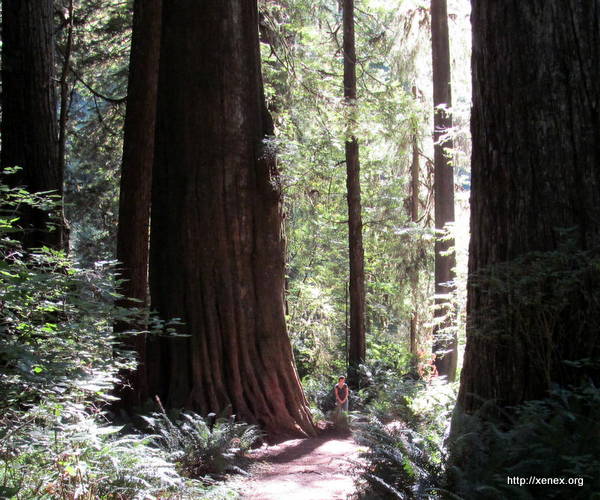
Sensing that I have gone too long without being released from the car, Amber stops on the side of the road. California is intelligent in that they allow for frequent shoulders among the redwoods. Otherwise, tourist would make their own and cause countless accidents.
So deep in the woods, the trees are far larger and more majestic. We had heard that there are some people who simply disappear into the woods, opting to lead more rustic existences among these giants. The idea is both intoxicating and agoraphobia-provoking, because there is a sensation one is always under surveillance in the forest. It may be true, too. Northern California is temperate enough to sustain a large homeless population. If one could manage to scale a tree and have survival skills enough to find food, one could easily lead a life outside scrutiny. I glance toward the canopies for obvious signs of habitation, but have to look away in deference to the fact that the leaves do not start for three hundred feet.
Even a few hundred feet from the road, it feels as though we wander primeval forest, as though we trespass in a place that has erstwhile been untouched by the hand of humanity. I had seen countless pictures of people hugging trees larger than their homes, but the scale is too dizzying to process unless you are at the foot of them.
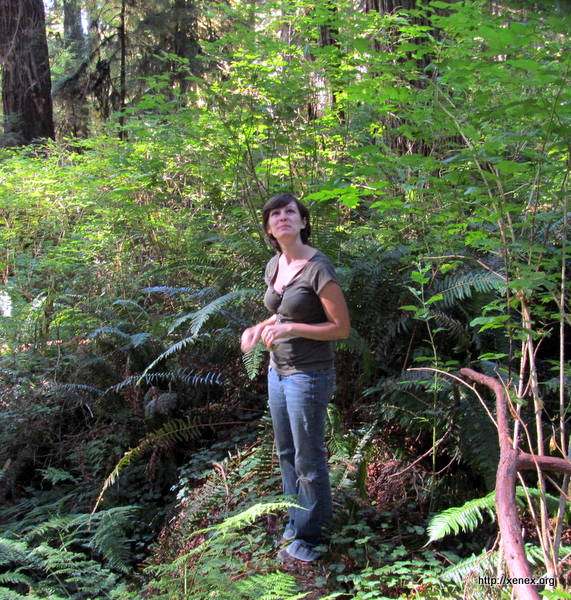
Eventually, we make our way back to the park, passing a half dozen cars stopped to look at a few elk grazing in the field, beside a sign informing viewers that there might be elk in this bare patch. I found this to be an eminently helpful sign.
The ranger at the ticket booth describes an arduous and detailed means of hiking to the beach Amber wishes to see before the park closes, then clarifies that, if we have a car, the other option is to drive five miles down the road and turn where there is a sign for the beach. The ranger's tone suggests that possessing a car is something few people do, even though we are sitting in a car when she tells us all this. She seems almost taken aback when Amber informs her that we would rather go directly to our destination.
Again, I am grateful for the fact that this is a rental car as we come to a stream running through the street. I do not mean the dirt road is wet or that it is a trickle of water. It is easily two and a half feet deep of running, brackish water.
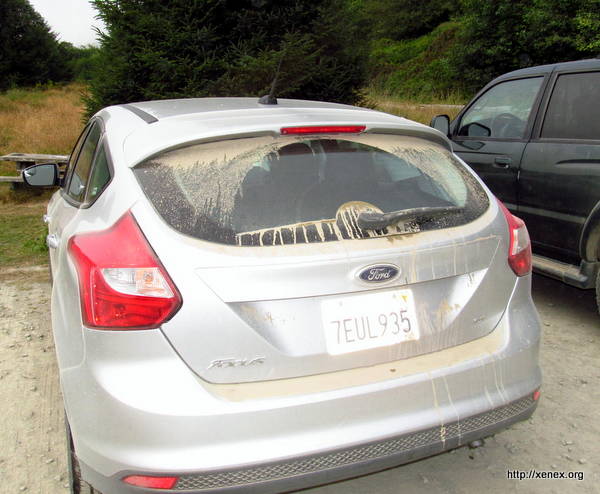
"So, I guess we park and find another way around?" I ask.
Amber scoffs. "No, sweet face. We ford this!" She pulls into the stream. The car grumbles as it seems to realize she is enacting a murder-suicide with it as the weapon. I wonder if I ought to have gotten more coverage on this car before the rental agency handed over the keys and what we will have to do when the engine seizes. Then Amber drives out again. The wheels are thus cleaned of a good thickness of mountain grit.
We come to another stream, which seems far less daunting. Amber guns it through the water and we come to the beach.
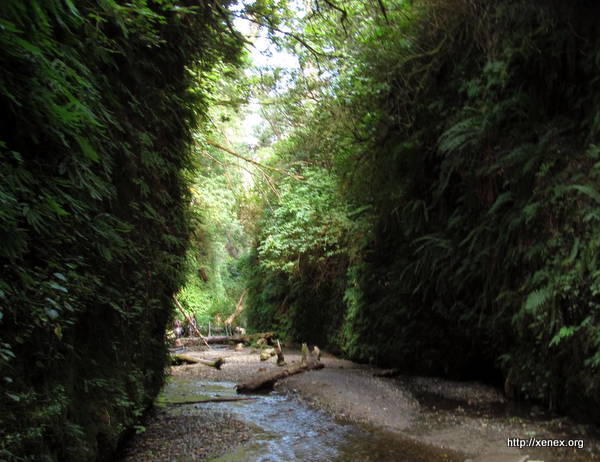
The main attraction here is creeping ivy on both sides of a crevice, with fallen trees generously interspersed. It is primordial and lovely. Around us are a dozen fellow tourists, taking pictures of most everything remotely photogenic and a few things that weren't. Amber, with her artist's eye, is in love with the place and takes a roll of film. (Though she has an excellent digital camera, she felt our honeymoon was the right occasion for color film.)
I later find out that this was the setting or inspiration for most modern movies that involve dinosaurs. It is a micro-climate that exists nowhere else in California, full of plants that otherwise would not survive.
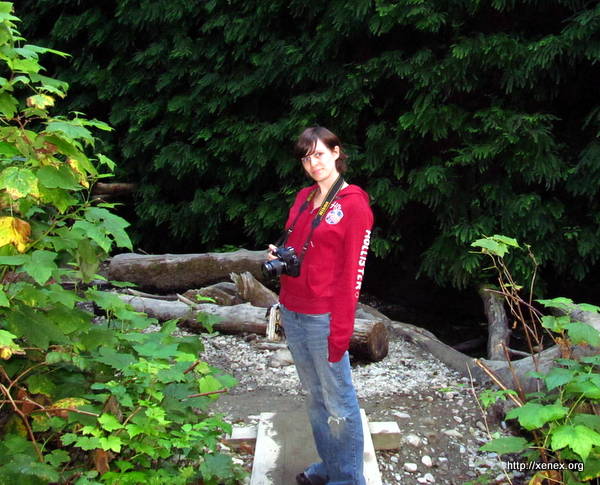
When we have had our fill of this particular flavor of beauty, Amber has us follow a path she found that goes into the woods. Her feeling is that this will take us to the adjoining beach, which I could not see from the parking lot because of the pervasive California mist. We have been traversing these paths for ten minutes when it occurs to us that human being did not make them, elk did. I become aware of this first and Amber only after I shout for her to stop walking directly into a couple of elk, who see her and take only brief notice. We were warned that elk are not like deer but rather more like moose. They will absolutely gore tourists for the hell of it. We consider our options here and, seeing that the elk are rather attached to their glen and we are attached to having our innards stay inside, we retreat on the path.
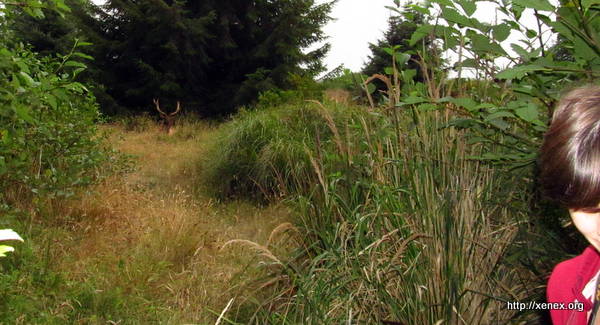
Amber pulls me through the mist to a white sand beach, the sort that pulls off shoes and ruins camera lenses. The deeper into the mist we go, the more the rest of the world seems to vanish. We cannot see the ocean, only hear it slamming into the beach until we are nearly in it. The water is arctic and makes this whole scene seem a bit more dreary than romantic. I would not be surprised if shoggoths wander the beach only a little down from us, though they would be impossible to see in the mist.
Amber promises that we will stop at the first eatery or gas station we come to in order to stock up on supplies for the drive home. This being California, these do not exist. I am not convinced human beings actually live here. They might be all animatronic models Disney is testing to see how long they can live without maintenance.
By this point, I am severely dehydrated and grumpy. I am cold from the mist and the temperature dropping another ten degrees when the sun dips below the redwoods. My camera no longer works properly because of the beach. Amber wants to stop at a park that has a demonstration of Native American crafting, suggested to her by the yellow map.
I pull the map away from her. "But there are no more activities to see today," I argue, scanning it. "And I have a headache."
"It might still be fun to see the houses."
"Your idea of fun may not match the human definition of the word."
Indeed, things are closed, though there are no people around to shoo us away from the subterranean houses. I find a water fountain and attach myself to its spigot so long I slosh when Amber pulls me away to read about a man massacring dozens of Native Americans in one of these houses. Somehow, no one noticed his crime until many years later, when they counted up the number of bones from different people who had been left to rot in his house. This must be what happened to the human residents of northern California. They weren't robots, they were wraiths the whole time, just hoping they could wear us down by neglecting to provide food and drink.
I bet they are the ones who made the yellow map.
On the way back to our bed and breakfast, on our way back to actual civilization, we pass a Target. I insist we stop, though it is about nine o'clock by this point. I immediate buy and consume a liter of water. Amber buys me popcorn to replace the salt lost by my complaining.
"If you are going to insist upon dragging me all over creation and California is going to refuse to have restaurants and grocery stores, we need to stock up on provisions," I tell Amber. "Provisions" ends up being a bag of peanut butter granola, teriyaki jerky, Bunnygrams, and several large beverages because I would never survive in the wild.
Soon in Xenology: Honeymoon!
last watched: The Shining
reading: The Time Traveler's Wife
listening: Mindy Gledhill
Wedding Wrap-Up ««« 2014 »»» More Eureka!
Thomm Quackenbush is an author and teacher in the Hudson Valley. He has published four novels in his Night's Dream series (We Shadows, Danse Macabre, Artificial Gods, and Flies to Wanton Boys). He has sold jewelry in Victorian England, confused children as a mad scientist, filed away more books than anyone has ever read, and tried to inspire the learning disabled and gifted. He is capable of crossing one eye, raising one eyebrow, and once accidentally groped a ghost. When not writing, he can be found biking, hiking the Adirondacks, grazing on snacks at art openings, and keeping a straight face when listening to people tell him they are in touch with 164 species of interstellar beings. He likes when you comment.